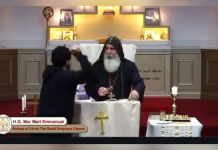Christ Church Fulwood in south-west Sheffield is one of the largest churches in the Church of England, so the resignation of its vicar on September 30th after a Bishops’ Visitation into his leadership is a major story.
The church gets over a 1000 people through its doors on a usual Sunday, compared to the around 50 that the average CofE church gets.
Since Canon Paul Williams became vicar of Fulwood in 2006 after serving as curate at another CofE conservative evangelical flagship church, All Souls Langham Place in central London, Christ Church has been responsible for four church plants or grafts within Sheffield Diocese.
These initiatives, actively promoted by Williams, involved members of Christ Church leaving with an ordained minister on the Fulwood staff team to form a new congregation in another part of Sheffield or further afield in South Yorkshire. In some cases, those leaving moved house to be part of their new church.
The Church Times has covered Williams’s resignation as has Evangelicals Now in its October issue.
But the coverage has been, to say the least, perplexing.
After a claim on Twitter in August that ‘the head of Christ Church Fulwood’ (the tweet did not directly name Williams) had been ‘forced’ to resign, the Bishop of Sheffield, Pete Wilcox and the suffragan Bishop of Maidstone, Rod Thomas, who has delegated oversight of the church due to its opposition to women bishops, issued a joint statement.
Williams’s resignation, they insisted, was ‘made freely’ and had their ‘full support’.
But what does that mean?
Did they want him to resign after the report resulting from their Visitation?
This, according to Fulwood’s senior curate Rev Pete Scamman when he announced his chief’s resignation to the church on June 27th, reported that ‘some within the church family’ had been ‘left feeling hurt by their experience of his (Williams’s) leadership’. The report also included Williams’s own account of his experience at the church over the previous year, Scamman said.
The Bishops’ statement raises the question of what practical form their ‘full support’ is taking. Williams is the one out of a job and eventually out of a house when a new vicar gets appointed. Is he moving to another CofE post or has he taken early retirement?
Has the Sheffield Diocesan Board of Finance, which is registered with the Charity Commission for England and Wales, reached a financial settlement with him under the highly unusual circumstances of his departure from office?
Would the Bishops have supported Williams had he chosen not to resign?
The Bishops’ statement prompts the questions that a responsible church journalist would want to put in the public interest, but unfortunately does not provide the answers.
Now it emerges from The Church Times clergy resignations and retirements section that Fulwood’s Minister for Students, Rev Andrew Fearnley, has also resigned, as of October 12th. Christ Church attracts a large number of students from the two universities in Sheffield, so this is a big job. Fearnley’s official title of ‘assistant curate’ did not quite capture that.
AI put the following question to the Fulwood churchwardens via the church office about Fearnley’s resignation:
Is this connected in any way with the resignation of Canon Paul Williams as vicar and is Rev Fearnley going on to another post in the Church of England?
And then the following three questions about Williams’s resignation in the light of the recent media coverage:
Would the Fulwood churchwardens have supported Canon Williams had he chosen not to resign?
Why did Rev Scamman announce Canon Williams’s resignation in June and not one of the churchwardens?
And what view do the churchwardens have of the pastoral care provided for Canon Williams by the Bishops of Sheffield and Maidstone?
Fulwood churchwardens, Emily Davies and Bill Thomas, responded:
‘We, at Christ Church Fulwood, are very grateful to Bishops Pete Wilcox and Rod Thomas for their assistance during the recent Bishop’s Visitation. The Visitation report has made a number of recommendations which the Fulwood PCC are progressing with the ongoing help and support of the Bishops.
‘With regards to the resignation of any particular individual, we do not feel it is appropriate for us to comment, given this is a personal decision.’
Christ Church Fulwood has been a leading player in the conservative evangelical movement in the CofE. Its vicar from 1969 to 1997, Rev Philip Hacking, became the first chairman of Reform, the Anglican evangelical network that formed after the CofE’s General Synod voted for the ordination of women to the priesthood in 1992.
Hacking’s successor as vicar of Fulwood, Canon Hugh Palmer, was rector of All Souls Langham Place from 2005 to his retirement in 2020.
Williams comes from a different background from Hacking and Palmer, both of whom were Oxbridge educated. He grew up in an upper-working-class home in Essex and was not university-educated, leaving school to work in newspaper advertising before going to conservative evangelical theological college, Oak Hill in north London, to train for ordained ministry, his first experience of tertiary education.
‘Essex Boy’ was a snobbish comment that was certainly bandied about behind Williams’s back in Fulwood circles.
Fulwood is part of the Sheffield Hallam constituency once represented in the UK Parliament by former Deputy Prime Minister, Nick Clegg. People living in Hallamshire have amongst the highest per capita wealth in the country.
Will Fulwood revert to a vicar who plays well socially with the expensively-educated, well-paid professionals that make up a large part of the Christ Church congregation or will the church get a pastor from a different social and educational background?
If the latter, it is surely legitimate in the wake of Paul Williams’s resignation to ask the question: how would the new vicar fare?
Julian Mann is a former Church of England vicar, now an evangelical journalist based in the UK.










